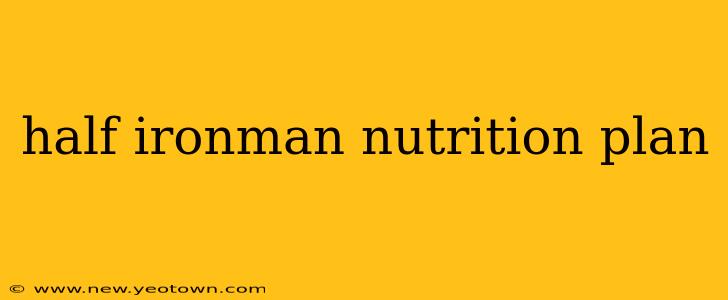The half Ironman, or 70.3, is a grueling test of endurance, pushing your body to its limits. Success hinges not just on training, but also on meticulously planned nutrition. This isn't just about fueling your workouts; it's about optimizing your body's performance across the entire race day, from the swim to the run. Think of your nutrition plan as another vital piece of training equipment – carefully calibrated to maximize your potential.
My name is Alex, and I've completed numerous half Ironmans. I’ve learned firsthand the critical role nutrition plays, and I'm here to share my insights and strategies to help you conquer your own 70.3. This plan is a guide, and you might need to adjust it based on your individual needs and preferences. Always consult with a registered dietitian or sports nutritionist for personalized advice.
What to Eat Before the Half Ironman: Race Day Fueling
The days and hours leading up to the race are crucial. You need to ensure your glycogen stores are topped off, and your digestive system is ready for the challenge.
The Week Before:
Focus on carbohydrate loading. This doesn't mean eating massive amounts of pasta; it's about consistently consuming complex carbohydrates like brown rice, quinoa, sweet potatoes, and whole-grain bread. Incorporate lean protein and healthy fats for balanced nutrition. Avoid trying new foods or supplements right before the race – stick to what you know works for your body.
The Day Before:
Keep your meal plan similar to the previous days, but slightly reduce the fiber content to avoid digestive issues during the race. A classic choice is a pasta dinner with lean protein and a small portion of vegetables. Avoid heavy, greasy foods.
Race Morning:
Start with a light, easily digestible breakfast 2-3 hours before the race. Good options include toast with a thin layer of jam or honey, a small bowl of oatmeal, or a banana. Hydration is key; start drinking water or an electrolyte drink early in the morning.
What to Eat During the Half Ironman: Sustaining Energy
This is where your strategy truly comes into play. Consistent fueling is essential to avoid "hitting the wall."
During the Swim:
For shorter swims, you might not need extra fuel. For longer swims, consider using a small energy gel or chews during the swim to maintain energy levels.
During the Bike:
This is the longest leg, and consistent energy intake is critical. Aim to consume 30-60 grams of carbohydrates per hour. This can be achieved through energy gels, chews, bars, or even real food, like bananas or energy muffins (if you can manage it!). Don't forget your hydration; sipping water or an electrolyte drink throughout is crucial.
During the Run:
Your energy needs might be slightly lower during the run, but you still need to replenish your glycogen stores. Continue to consume carbohydrates, aiming for around 30-45 grams per hour. Energy gels or chews are often easier to manage while running. Remember, hydration remains crucial.
What to Eat After the Half Ironman: Recovery and Replenishment
Post-race recovery is just as important as the race itself. Your body needs fuel to rebuild and repair.
Immediately After:
Consume a combination of carbohydrates and protein within 30-60 minutes of finishing. This helps replenish glycogen stores and aids muscle recovery. A protein shake or smoothie is an excellent choice.
The Following Days:
Continue to prioritize carbohydrate and protein intake to aid in recovery. Eat plenty of fruits, vegetables, and lean protein sources. Stay well-hydrated. Your body will be working hard to repair itself.
How Much Water Should I Drink During a Half Ironman?
Hydration is paramount throughout the entire race. Dehydration can significantly impair performance. Start hydrating well before the race and continue consistently throughout. The exact amount will vary based on individual factors like body weight, sweat rate, and weather conditions. Aim to consume enough fluids to maintain urine output – a pale yellow color is a good indication.
What Supplements Should I Take for a Half Ironman?
While a balanced diet should provide most of your necessary nutrients, some athletes choose to use supplements. Common options include electrolytes (to replace those lost through sweat), creatine (for muscle power), and branched-chain amino acids (BCAAs) for muscle protein synthesis. However, consult a doctor or registered dietitian before adding any supplements to your routine.
What Foods Should I Avoid Before a Half Ironman?
Avoid high-fiber foods in the days leading up to the race to prevent digestive upset. Spicy foods, greasy foods, and anything new or unfamiliar are best avoided as well. Stick to foods your body is accustomed to.
This nutrition plan provides a framework; individual needs may differ based on factors like body weight, metabolism, and training intensity. Remember that consistent training, proper hydration, and a well-planned nutrition strategy are your winning combination. Embrace the challenge, enjoy the journey, and conquer your half Ironman!

